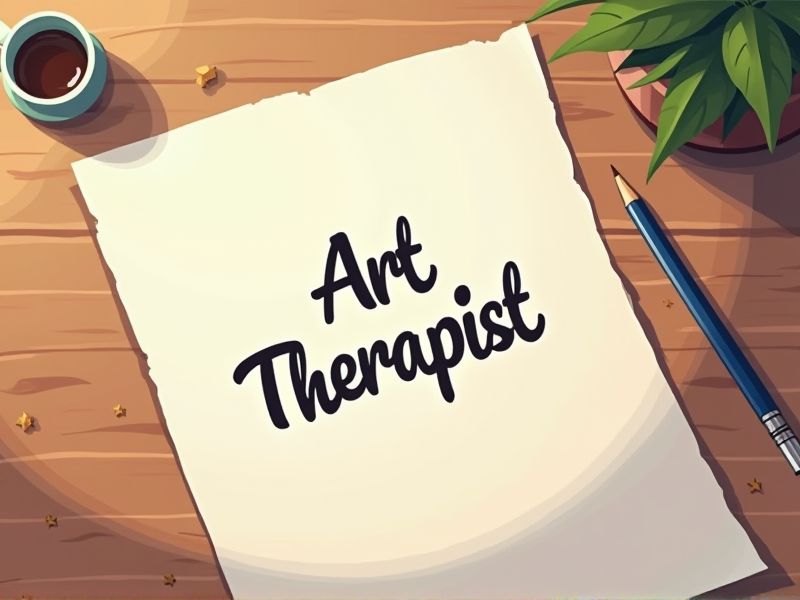
Art therapists require specific certifications to ensure they possess the necessary skills and knowledge to effectively aid clients through creative expression. These certifications validate the therapist's understanding of psychological principles and artistic techniques essential for therapeutic interventions. Without these credentials, art therapists may lack the credibility and professional standards crucial for client trust and successful outcomes. Here are some important certifications you may need for a career in art therapy.
Registered Art Therapist (ATR)
A Registered Art Therapist (ATR) ensures that the individual practicing art therapy has met specific educational and professional standards, safeguarding client well-being. Their certification provides a degree of trust and credibility, important for clients seeking therapeutic support through art. ARTs possess specialized knowledge and skills necessary for effective assessment and intervention strategies, enhancing therapy outcomes. They maintain professional accountability and ethical standards, reducing the likelihood of negligent practice.
Board Certified Art Therapist (ATR-BC)
The credential of Board Certified Art Therapist (ATR-BC) demonstrates that an art therapist has met rigorous professional standards, providing assurance of their expertise. Certification involves passing a comprehensive exam, which indicates a therapist's advanced competency in applying therapeutic practices through art. The credential helps establish trust with clients and employers, as it reflects a commitment to ongoing professional development. It also enhances the art therapist's professional credibility, increasing opportunities for practice in diverse settings.
Certification in Expressive Arts Therapy (CEAT)
Certification in Expressive Arts Therapy provides a structured framework that enhances an art therapist's understanding of diverse creative modalities. This certification ensures practitioners have met standardized educational and ethical competencies necessary for effective therapy. Employers and clients are more likely to trust and select therapists who have validated credentials. Expanding one's expertise through certification can increase job opportunities and professional growth in therapeutic settings.
Certificate in Creative Arts Therapy (CCAT)
The Certification in Creative Arts Therapy (CCAT) provides a standardized framework that ensures art therapists possess the necessary skills and knowledge to effectively support diverse client populations. This certification fosters legitimacy and credibility within the therapeutic community, enhancing trust in the profession. Art therapists with a CCAT can access broader professional opportunities, as many institutions require certified qualifications for employment. Adhering to certification standards encourages ongoing education and adherence to ethical guidelines, improving therapeutic outcomes for clients.
Licensed Professional Counselor (LPC)
An LPC credential for an Art Therapist enhances credibility and professional standing, increasing trust with clients and other healthcare professionals. It ensures adherence to established ethical standards and legal responsibilities, safeguarding both clients and the therapist. Art Therapists with LPC certification have broader recognition, allowing for more diverse work settings such as hospitals, schools, and private practices. The LPC emphasizes essential counseling skills that complement art therapy techniques, providing a more holistic approach to client care.
Licensed Mental Health Counselor (LMHC)
Art Therapists often work with individuals dealing with emotional and psychological challenges, and an LMHC can provide the necessary clinical skills to assess and treat mental health conditions. Art Therapists may encounter complex mental health issues that require diagnostic skills, which an LMHC is trained to offer. Holding an LMHC license allows Art Therapists to practice independently, broadening their scope of practice and enhancing career opportunities. Mental health regulations often require licensed professionals to handle specific mental health interventions, making an LMHC crucial for compliance and credibility.
National Certified Counselor (NCC)
Becoming a National Certified Counselor (NCC) enhances an art therapist's credibility by certifying their adherence to recognized professional standards. This certification assures clients that the therapist possesses a robust foundation in counseling techniques, which complements their art therapy skills. The NCC credential broadens an art therapist's scope of practice, allowing for more comprehensive support services. It often leads to increased career opportunities and potential for higher compensation in the field.
Marriage and Family Therapist (MFT)
Art therapists often deal with clients expressing deep emotions through creative means, and MFTs can provide frameworks for understanding the impact of family dynamics on these emotions. When art therapy reveals underlying familial or marital issues, MFTs offer strategies to address these concerns directly. Art therapists can collaborate with MFTs to create holistic treatment plans that consider both personal expression and relational contexts. The integration of MFTs enhances the therapeutic process, ensuring that broader interpersonal influences are acknowledged in treatment.
Certified Clinical Mental Health Counselor (CCMHC)
Art therapists with a CCMHC certification demonstrate advanced expertise in integrating mental health counseling techniques with creative therapeutic practices. This credential enhances their ability to assess and address complex psychological issues encountered during art therapy sessions. As mental health challenges become more multifaceted, the CCMHC provides art therapists with the comprehensive skills needed to formulate evidence-based treatment plans. The certification helps in establishing credibility and trust with clients and healthcare institutions, ensuring that therapeutic interventions are both creative and clinically sound.
Graduate Certificate in Art Therapy
A Graduate Certificate in Art Therapy provides specialized knowledge and skills essential for effective therapeutic practice with clients. It ensures that art therapists meet professional standards and ethical guidelines required in clinical settings. With structured coursework, it supports the development of critical competencies in assessment and intervention techniques. Completing this certification often enhances career prospects by meeting credentialing requirements set by licensing boards or professional associations.
Summary
You, as an art therapist, can expect to enhance your professional credibility when obtaining certifications. These credentials often lead to increased trust from clients and employability in diverse therapeutic settings. Certification can result in access to a broader network of professional opportunities and collaborations. You may also see improved versatility in therapeutic techniques and enriched client outcomes through recognized expertise.
